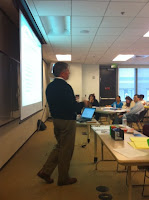Often when you are applying for grants clients get very excited and can tend to exhibit what Alan Greenspan called “irrational exuberance.”
- Establish a planning committee before the RFP is publicized. Be certain to include all relevant partners who may be interested in participating, impacted by the grant services, and who are logical partners to share costs and in-kind services.
- Maintain meeting records for the committee including roster, minutes, and agendas.
- Engage the committee in a needs assessment and program planning process.
- Work out collaborative agreements and partnerships.
- Develop memoranda of understanding and letters of commitment among the partners.
- Gather resolutions from boards and leadership committees of the partner organizations.
- Obtain commitments from the partners for materials, services, budget commitments, participation in governance, and commitment to contribute data.
- Develop a program design that the planning committee is in agreement with to address the needs identified in item 3.
- Create an evaluation design to ensure that partners are aware and committed to data collection that will validate the achievements of the grant program.
- Engage the planning committee in reviewing the grant narrative as it is being developed in order to ensure its accuracy and feasibility.
Often it is the responsibility of the grant writer to act as the voice of reason and to share their experience with clients who may be irrationally exuberant (or irrationally hesitant) about a grant opportunity. This may seem counterintuitive, in that you may feel that you are losing valuable business; however, it’s good business to bring funding to your client if it is going to result in positive programs and positive outcomes that make them look good and help them achieve their mission. Enabling clients to apply for grants that they are either unqualified to implement or are of a scale that is beyond their capacity is harmful to your relationship with your client in the long run.
My master teacher always told us that failing to plan was planning to fail. Grant writers must be proactive in assisting their clients in the planning process to ensure that the grant submitted is realistic both in terms of current reality and future feasibility for implementation.
By: Derek Link
————————————
Other posts from The GrantGoddess Speaks that you might like:
How Did I Learn Grant Writing? – Derek Link
Grant Writer Stalked by Client
Rantings of an Opinionated Grant Writer
Help! Grant Writer Downing in Paper!
How Positive Writing Makes a Better Grant
Also, take some time to visit A Writer’s Journey for more thoughts on writing.


.jpg)

